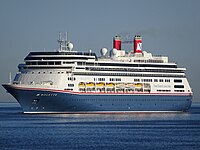
Photo from wikipedia
Now more than ever, the amount of fuel a ship consumes and the amount of carbon dioxide emitted from a ship have attracted many researchers’ attention towards efficient and cost-effective… Click to show full abstract
Now more than ever, the amount of fuel a ship consumes and the amount of carbon dioxide emitted from a ship have attracted many researchers’ attention towards efficient and cost-effective ship designs. Therefore, fuel consumption and carbon dioxide emission reduction are two main targets of almost all industrial and scientific communities. The key scope of this article is to describe an innovative methodology for the variable-fidelity design optimization of a ship’s hull-propeller system under multiple operating conditions in early-stage ship design. Non-uniform rational basis spline technique and the efficient multi-objective evolutionary algorithm based on decomposition are, respectively, used to generate variants of hull-propeller designs and minimize the fuel consumption and carbon dioxide emission as objective functions of the proposed problem. The variable fidelity numerical solvers are also applied for the hydrodynamic evaluation of the design performance during optimization. Three different specific fuel oil consumption data provided by the engine manufacturers Wartsila, MAN B&W and Caterpillar are used to optimize a medium-sized bulk carrier driven by a well-known propeller as the initial design. The numerical results show an improvement in performance of the optimal hull-propeller designs.
Journal Title: Proceedings of the Institution of Mechanical Engineers, Part C: Journal of Mechanical Engineering Science
Year Published: 2019
Link to full text (if available)
Share on Social Media: Sign Up to like & get
recommendations!